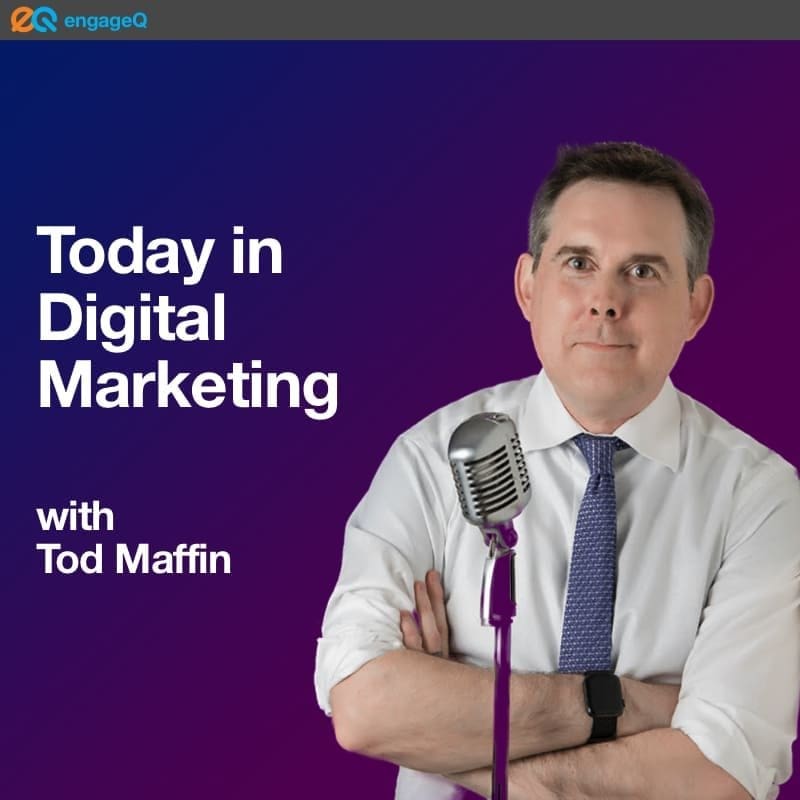Cookie Cancellation: Cancelled
Google drops plans to remove third-party cookies from Chrome. After all the chaos, will the decision make any difference at all for marketers?
by Tod Maffin (email • LinkedIn • social media)
Today's News
Google Shelves Plan to Remove 3rd Party Cookies
Want to Rank Higher? Be More Patriotic!
Google Releases Updated Desktop Ads Editor
Google Shelves Plan to Remove 3rd Party Cookies
Google’s never been hesitant to shut down products and plans (I’m still pissed about them disappearing Google Reader and that was like 200 years ago).
Well, on brand, Google has cancelled something else — this time, its plans to strip third party cookies out of its Chrome browser.
They never really had a solution
This was, of course, one of the biggest plans in the digital ad space — replacing the aging tracking code with… well, they weren’t sure. And turns out, that was part of the problem.
Google tried lots of ways to claw back the data lost without those cookies, but it turns out there wasn’t a way to do it that both satisfied advertisers and maintained the privacy commitments Google had promised and regulators had demanded. They were two sides of a teeter-totter that could never get in balance.
Suffice to say, the decision took a lot of marketers by surprise. Google had been working on these plans for several years, and delayed them three times.
What’s next then?
Nobody’s quite sure. Even Google’s not sure, though they did promise a vague new system:
What that ends up being could be as simple as the “don’t track me” switch that other browsers have had for years. Considering Google’s primary revenue comes from ads, that’s a switch they’ve been hesitant to offer.
Analysis from Jyll Saskin Gales
Jyll, I want to get your take on this, but I feel like I didn't do a very good job explaining the basics here. What are third-party cookies?
Cookies are just little pieces of code that get dropped on your browser when you visit different websites.
First-party cookies means the website you're visiting, like newyorktimes.com, is the one who drops that code, which means they can then recognize you when you visit their website again.
Third-party cookies are when you're on the New York Times website, but Google drops a cookie on your browser to do things like track your behavior for Google Analytics or see if you convert for Google Ads. You're on the New York Times website, but Google's the one dropping the cookie: that is a third-party cookie.
It's a very old and simple — but in a way, kind of elegant — technology that enables websites to recognize you the next time you come back because they'll check your browser, they'll see that cookie, that piece of code, and they'll say, “Aha! This person was here before, let's log them in automatically, or let's make a note that they're a returning visitor.”
And why did Google want to get rid of them in the first place? Is it all about sort of privacy concerns? People just don't like to be tracked?
Pretty much. I don't think Google wanted to get rid of them, as we can see now, but lots of pressure, understandably, from privacy groups.
As I mentioned, it's an old technology. It can expose a lot of sensitive information to the browser. There's no opportunity for that to be hijacked, so it just wasn't really safe.
And there were a lot of drawbacks.
For example, you can't do cross-device tracking with cookies if someone visits on the phone and then opens up their computer. That would be two separate cookies, [and seen as] two separate users.
There's definitely drawbacks to them. Google has been trying for many years to find other solutions, but alas, given up now and we're sticking with cookies.
They really have, haven't they? I mean, we've seen FLoC, we've seen Topics, we've seen the Privacy Sandbox. Why are third-party cookies so hard to replace?
In a way, because this technology came out so long ago, it really is elegant in its simplicity. It just makes it super easy to be able to track user behavior online.
All these other solutions are very highly engineered solutions and they're modeling and predicting and AI, and they just don't end up being as effective as good old-fashioned, just tag this person,we can recognize you next time.
So more engineering and more AI power does not always equal more effective results. And ultimately, all these tests fail to deliver the same quality of audience data needed, the same conversion focused results that advertisers need.
Have marketers moved past third-party? I feel like a lot of us have moved past third party now. Will this have any sort of day-to-day effect on advertisers?
It absolutely will. Although Google Chrome is keeping cookies, there are other browsers out there like Safari, like Firefox that have killed cookies. So already your remarketing campaigns today are not as effective as they were a few years ago. Your conversion tracking today is not working as accurately as it was a few years ago. So you're already feeling that.
And the second thing I'll say is because Google kept delaying and delaying and delaying, I would bet that most businesses out there, especially smaller businesses, have not implemented, what we call the more durable solutions: enhanced conversions or offline conversion tracking or server-side tracking.
You may have heard these terms bandied about before, but I would bet most advertisers haven't implemented them yet.
That being said, even though third-party cookies are here to stay in Google Chrome, because they're gone from other browsers, and look, Google could change their mind again at any time. We've seen that happen before.
I would still recommend that if you have not looked into a third-party cookie, first-party data solution, you know, gathering customer email addresses, feeding that to your conversion tracking through enhanced conversions, you should still do that even though third-party cookies are here to stay.
🎁 Everyone who guesses will be entered in our monthly draw for a full year of our Premium Newsletter free!
Tomorrow, Wednesday July 24th at 10am Eastern, 3pm UK is the free online event for paid ads practitioners called PPC Zone, and you're invited!
Hosted by our very own Google Ads Correspondent, Jyll Saskin Gales, PPC Zone elevates new perspectives and insights in the paid ads industry.
You can join the livestream on YouTube or LinkedIn, watch the presentations and get your questions answered during the live panel – all in under an hour.
Tomorrow's speakers will be sharing their best tips on Using Google Analytics 4 for PPC, Setting KPIs for your Account, and Optimizing Your Merchant Center Feed. To learn more, or to apply to speak at a future event, visit ppc.zone
Want to Rank Higher? Be More Patriotic!
If you’re frustrated that Google isn’t surfacing your brand’s web site as often as you’d like, and are prepared to make big changes to fix it, you might try changing your domain name.
Change your country domain
Google search engineer Gary Illyes recently did a Q&A and confirmed that the search engine gives a ranking boost to domain names that end in country codes, like .ca for Canada, or .in for India, or .kr for Korea.
But that ranking boost would only apply to people searching from that region. In other words, if your web site ends in .ca and it’s someone in Canada that’s searching, you’ll benefit. But only a little.
Change your language
If you want to double-down on this strategy, Illyes says what gives national results even more of a boost is using the language of that country as the language on your web page.
Google Releases Updated Desktop Ads Editor
Google has released version 2.7 of the Google Ads Editor — that’s its downloadable desktop version of the ads manager, adding new features and removing old ones.
Key additions in version 2.7:
AI-generated assets: Users can now add AI-generated headlines and descriptions to asset groups using final URLs and prompts.
Video partners for Demand Gen campaigns: Video partners can now be included in Demand Gen campaigns.
New customer acquisition goal: Set at the campaign level for Search and Performance Max campaigns.
Account-level content label exclusions: Found under Tools in Content Suitability. Migrating Display Ads to Performance Max now includes these exclusions at the account level.
Account-level negative keywords: Manage account-level negative keywords, including excluded content keywords, under Tools in Content Suitability.
Other account-level settings: Includes inventory types.
Fixed CPM bidding strategy: Renamed from Reserve CPM, now supports Video campaigns.
Reasons for paused keywords: Displays reasons in the Status column for automatically paused keywords.
Export selected types to CSV: Export specific data types to CSV files.
Hide empty items: Checkbox available in the “Manage” pane and 3-dot menu.
Video format preferences for Demand Gen Video ads: Set format preferences for individual ads.
Removed features in version 2.7:
Smart Shopping campaigns and ads: Fully deprecated.
Feed-based location assets: No longer supported; accounts migrated to asset-based location assets.
Feed-based location groups: No longer supported; accounts migrated to asset-based location group targeting.
Europe Really Hates Meta’s “Pay for Privacy” Plan
The European Commission (EC) has moved to block Meta's plan to charge users a subscription fee for privacy on its platforms.
This action wasn't taken under the Digital Services Act, the Digital Markets Act, or the General Data Protection Regulation (GDPR). Instead, the EC cited EU consumer laws. It warned Meta of possible sanctions if it doesn't address concerns about its “pay or consent” model.
Meta's plan forced users to either pay to use Facebook and Instagram or consent to personalized ads. The EC says this pressures users to quickly choose, fearing loss of access to their accounts.
The EC also noted that Meta's complex terms could confuse users.
Meta: ‘Nothing to see here’
For its part, Meta defended its model, saying it complies with European regulations.
If no agreement is reached, Meta could face fines up to 4% of its annual turnover under the EU's Unfair Contract Terms Directive.
Amazon and BBB Sues Alleged Fake-Review Farm
Amazon and the Better Business Bureau (BBB) have filed a lawsuit against ReviewServiceUSA.com for allegedly selling fake positive reviews.
The lawsuit claims the site used fake customer accounts to boost product and business ratings on Amazon and BBB profiles.
This is Amazon’s first joint lawsuit against fake review brokers. ReviewServiceUSA did not respond to requests for comment.
Amazon keeps fighting
In 2022, Amazon sued AppSally and Rebatest for allegedly coordinating free items or money in exchange for false reviews.
In late 2022, it launched a campaign to help shoppers spot scams during the holiday season. Amazon also introduced an AI tool last August to summarize product reviews for customers.
– 30 –
Maximize Sales with Strategic Influencer Partnerships
Join the marketing revolution with Stack Influence, where micro-influencers aren't just promoters—they're real customers. Their authentic endorsements help elevate your brand's credibility and boost sales, as proven by our success stories with major brands.
Upgrade Your Media Buying Skills:¹
Google Ads for Beginners
Inside Google Ads: Advanced
Foxwell Founders Community
Foxwell Digital Courses
Tools We Use and Recommend:¹
Marketing tools: Appsumo
Podcast recording: Remotely
Email newsletter: Beehiiv
¹ Some links provide affiliate revenue














